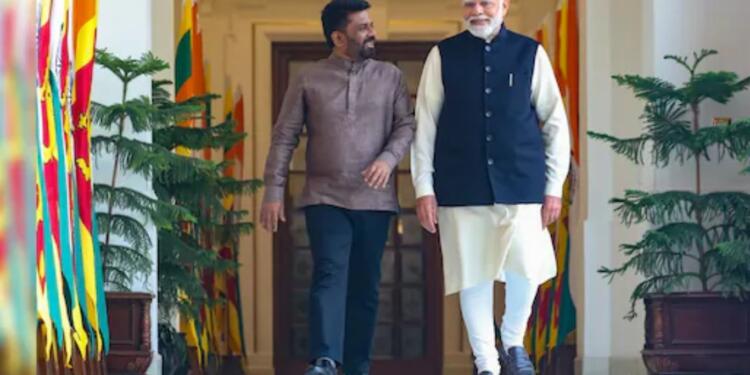India’s outreach to its closest partner in the Indian Ocean region, Sri Lanka, appears to have paid off with visiting President Anura Kumar Dissanayake stating categorically that “we will not allow our land to be used in any way in a manner that is detrimental to the interests of India”.
Coming as it does amid attempts by China to pursue its Mission Indian Ocean, the visitor’s statement may have pleased the Indian government as the latter reciprocated with a slew of announcements to help the island nation overcome some of its economic difficulties.
Prime Minister Narendra Modi and President Dissanayake also decided that their countries will soon finalise a defence cooperation agreement.
Dissanayake’s decision to choose New Delhi as his first international stop after becoming president paid off, considering India has been trying to counter the growing Chinese influence in its own backyard.
The presidential visit to New Delhi smoothens India’s feathers ruffled in August 2022 with the docking of the Chinese missile and satellite tracking ship ‘Yuan Wang’ at Hambantota port. India’s concerns renewed again in 2023 when another Chinese warship docked at the Colombo port.
India’s anxiety was all the more visible because it has always seen Sri Lanka as a strategic ally in the Indian Ocean Region and the country has received prime attention in India’s SAGAR and Neighbourhood First policies.
Dissanayake had visited New Delhi earlier in February and his statements were well received in New Delhi. His attitude might have been influenced by the fact that India had given Sri Lanka assistance worth $4 billion during the latter’s economic crisis.
India was, however, aware, that Dissanayake would have an independent mind when it came to assessing his country’s future ties with its neighbours and that he might want to have a balance of ties between India and China.
In fact, Dissanayake clarified on this, saying his government was committed to whatever was in Sri Lanka’s best interest. He also said that he did not want to be “sandwiched” in the geopolitical tussle between India and Sri Lanka.
He showed he was a pragmatic leader, his party’s election manifesto showed he understands the value of friendship with India for developing Sri Lanka into a maritime hub, a port and trading hub, and a regional logistics management hub, and will rely on the island nation’s connectivity with India.
Since then, there has been a flurry of diplomatic activity between the two countries.
India’s Foreign Minister S Jaishankar visited Colombo in October and extended Prime Minister Modi’s invitation to Dissanayake. Things have now come full circle with Dissanayake having come to India and extended a return invitation to PM Modi to visit his country.
The understanding between PM Modi and Lankan President Dissanayake about their mutual concerns was reflected in their joint statement.
“Recognising shared security interests of India and Sri Lanka, both leaders acknowledged the importance of regular dialogue based on mutual trust and transparency, and giving primacy to each other’s security concerns. As natural partners, both leaders underscored the common challenges faced by the two countries in the Indian Ocean region and reaffirmed their commitment to work together in countering traditional and non-traditional threats as well as to ensure a free, open, safe and secure Indian Ocean region. India being Sri Lanka’s closest maritime neighbour, Dissanayake reiterated Sri Lanka’s stated position of not permitting its territory to be used in any manner inimical to the security of India as well as towards regional stability.”
Also Read: This Week in Focus: These Steps Are Necessary To Avoid Another Atul Subhash Tragedy
PM Modi stated that he and Dissanayake were in “full agreement that our security interests are interconnected.” He further mentioned that they had agreed to cooperate on hydrography and decided to “quickly finalise the Security Cooperation Agreement.”
India, however, will closely watch the next moves of Dissanayake.
After all, he will have to visit Beijing in the near future considering his policy of having ties with both countries. Sources in his government suggest China will be the second country he will visit.
China, which has taken over Sri Lanka’s Hambantota Port after Colombo failed to pay off Chinese debt, has been docking its naval surveillance and spy ships in the island nation. The repeated docking of Yuan Wang 5 at Hambantota is detrimental to New Delhi’s interests due to Sri Lanka’s proximity to India.
China had taken possession of the Hambantota port for a lease of 99 years after Colombo was unable to repay $100 million annually for the $1.7 billion loan that it had taken for the construction of the port, the first phase of which was completed in 2010.
But the latest India-Sri Lanka agreement ensures Sri Lankan territory, including its waters shall “not be used in any manner inimical to the security of India”. Nor for any operations that may adversely impact the regional stability.
China, monitoring Dissanayake’s visit to New Delhi equally closely, has not shied away from acknowledging the importance of the visit.
Its ambassador to Sri Lanka Qi Zhenhong said: “We are very glad to see this development because India and Sri Lanka are close neighbours. When the two countries enhance their relationship and promote their economic cooperation, they can deliver benefits to two peoples.”
He admitted China too has officially invited Dissanayake to visit Beijing at the earliest and at his convenience.

























